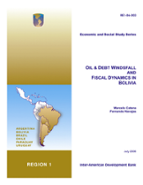Oil & Debt Windfalls and Fiscal Dynamics in Bolivia
Date
Jul 2006
During 2004-06 Bolivia experienced a five-fold increase in oil revenues due to tax/ contractual innovations, higher prices and larger volumes at the same time that a multi-lateral debt reduction initiative trimmed roughly one third of the public external debt. The political economy setting of this environment entails a new hydrocarbons law that automatically decentralize expenditure to local governments and nationalization of the oil industry. This paper presents a model of fiscal dynamics in Bolivia in a stochastic framework and finds that the new status-quo will generate double reversions of primary surplus and a public debt path that may fall short of being pleasant in the presence of unfettered fiscal spending and/or decline in international energy prices and gas demand from its neighbors. The authors conclude that governance of the process of allocations and distribution of the oil rent is essential to the short to medium term sustainability of the new Bolivian model.



